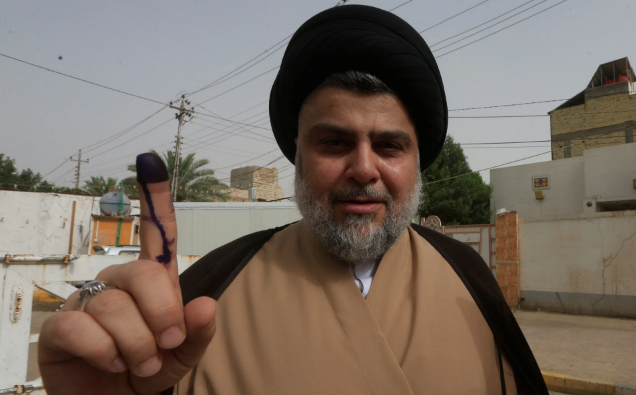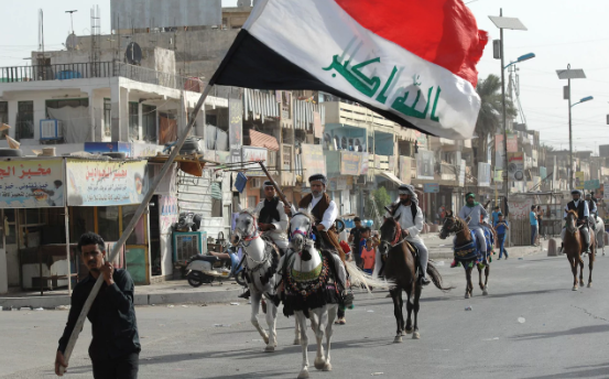A decade on, one might expect Iraq's new democracy to have served due process on such a man – if not for killing British troops, then for the countless Iraqis killed by his sectarian death squads.
Instead, far from being on the run or behind bars, he is now Iraq's most powerful politician, after emerging on Monday as the shock victor in last weekend's Iraqi elections.
Having reinvented himself as a pacifist, non-sectarian moderate – his Mehdi army units have been rebranded as "peace brigades" – his political bloc triumphed unexpectedly over that of prime minister Haider al-Abadi, the favourite to win.
But at the British and US embassies in Baghdad, it is already being seen as yet another case of democracy delivering the "wrong result" – this time, one that puts Brexit and Donald Trump into perspective.
For to this day, Mr Sadr remains the most staunchly anti-Western of all Iraq's political players, especially on the question of foreign troops on Iraqi soil.
Luckily for the embassies' protocol departments, their ambassadors will not have to fret about whether to shake his blood-soaked hand. Being a cleric who is technically "above" politics, Mr Sadr did not run directly for office himself, and therefore will not become prime minister.
He will, however, be the kingmaker for whoever gets the top job. And no matter how much peace-and-love rhetoric he talks, not everyone will be buying into his new persona as an Iraqi John Lennon.
This, after all, was the man who declared open warfare on the West from 2004, sending thousands of young men from Iraq's Shia slums to their deaths in one-sided battles against coalition troops. Those odds then evened in deadly fashion as Iran trained his men how to use armour-busting IEDs, making the Mehdi Army as big a foe as Sunni-led al-Qaeda.
After the Sunni-Shia civil war of 2006-7, in which the Mehdi Army carried out sectarian cleansing campaigns in Baghdad, he fled to Iran. Four years later, though, he was back – partly because he'd pledged to lay down his arms, partly because nobody could really stop him.
In yet another unlikely epiphany, he now styles himself as an Iraqi nationalist rather than an Iranian pawn. He claims – again without a hint of irony – that foreign interference has been the country's downfall.
Since the election results started trickling in, diplomats have been doing their best to find "positives" in Mr Sadr's strong showing. In trying to reach out to Iraq's Sunnis, they argue, he is at least abandoning the sectarian rhetoric that has scarred Iraqi politics for so long.
Yet while some Sunni voters appear to have taken him at face value, others fear a re-awakening of sectarian tensions. "First he wanted to kill us, now he is going to rule over us," said one Iraqi I spoke to yesterday, who lost a relative to a Mehdi army death squad. "This will just be a spark to detonate trouble again."
The Sadr bloc's victory was all the more surprising given that Mr Abadi, who has just finished kicking the Islamic State out of Mosul, was arguably the first Iraqi prime minister in a generation who could boast of a concrete acheivement.
However, that success was as much down to the efforts of Shia militias as the Iraqi army, which melted away when the Islamic State first took over Mosul.
Away from the battlefield, Mr Abadi has been little more effective than previous Iraqi leaders: a promised anti-corruption drive, for example, got nowhere, meaning many middle-class Iraqis did not even bother to vote.
One of the Sadr bloc's first demands of whichever new PM they back is likely to be a dramatic downscaling – if not the immediate removal – of all coalition forces involved in the fight against Islamic State.
Exactly who that frontman will be is not yet known. After every Iraqi election, the country's byzantine political factions usually spend months horsetrading before a prime minister is chosen.
One thing, though, is clear. It is unlikely to be the kind of secular, liberal-minded technocrat that the West presumed would soon hold sway after Saddam's fall. In a country where an MP's importance can still be measured by the number of assassination attempts they've had, politics still favours the strong, the combative and the religiously devout.
Mr Sadr represents all three of those strands in abundance. And as long as his influence lasts, Iraqi-style democracy is unlikely to resemble the kind that British troops gave their lives for.
Source: www.telegraph.co.uk/news/2018/05/15/iraqs-west-installed-democracy-has-given-backing-militia-leader/



 RSS Feed
RSS Feed